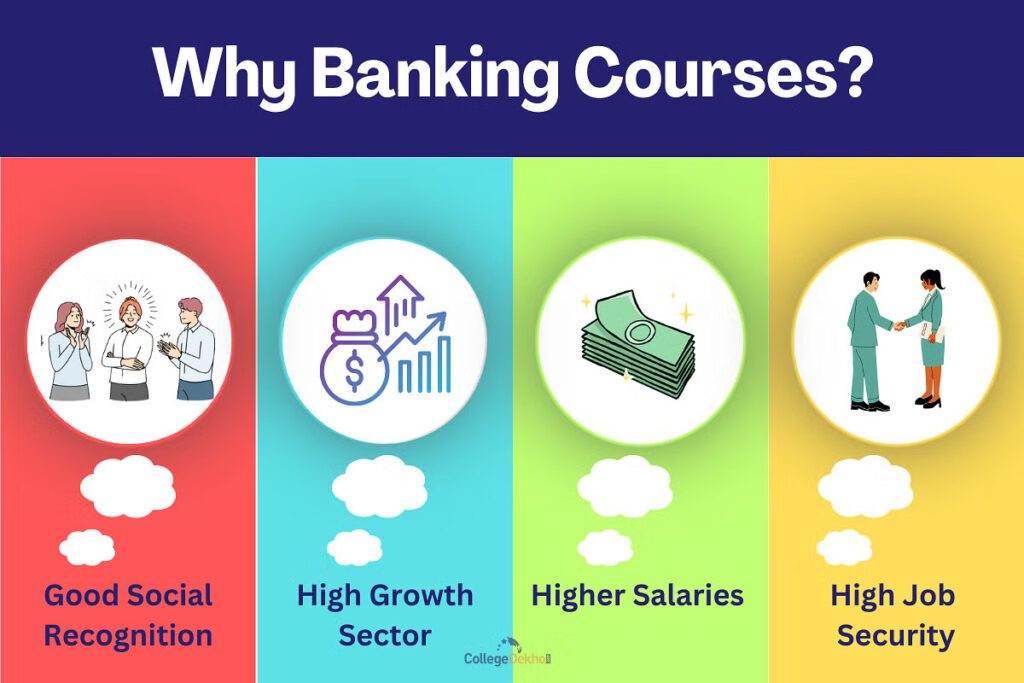Banking courses have emerged as a valuable resource for individuals aspiring to excel in this field, offering a range of programs designed to provide a comprehensive understanding of banking operations
In today’s dynamic and competitive financial landscape, the banking sector plays a pivotal role in driving economic growth and stability. As the industry evolves, Banking Courses & professionals are increasingly seeking specialized knowledge and skills to navigate the complexities of banking. Banking courses have emerged as a valuable resource for individuals aspiring to excel in this field, offering a range of programs designed to provide a comprehensive understanding of banking operations, regulations, and emerging trends.

Types of Banking Courses:
- Bachelor’s Degree in Banking and Finance:
- A foundational program that covers core principles of banking, financial management, and economics.
- Provides a broad overview of banking operations, risk management, and regulatory frameworks.
- Master’s in Banking and Finance:
- Offers in-depth knowledge and specialization in areas like investment banking, corporate finance, and financial analysis.
- Includes coursework on advanced financial modeling, international banking, and strategic financial management.
- Diploma in Banking:
- A shorter, more focused program for individuals seeking a quick entry into the banking sector.
- Covers fundamental banking concepts, customer relationship management, and basic financial analysis.
- Certification Courses:
- Various professional certifications enhance specific skills. Examples include the Chartered Financial Analyst (CFA), Certified Financial Planner (CFP), and Certified Information Systems Auditor (CISA).
- These certifications validate expertise in areas like risk management, investment analysis, and information security.
- Online Banking Courses:
- With the rise of digital learning, many institutions offer online courses, making education accessible to a global audience.
- These courses cover topics such as digital banking, fintech, and blockchain technology.
- Specialized Training Programs:
- Some institutions provide short-term training programs on niche topics, such as anti-money laundering (AML), credit risk management, or financial product development.

Core Curriculum:
Banking courses typically cover a broad spectrum of subjects to ensure a well-rounded understanding of the industry. Common modules include:
- Financial Accounting and Analysis:
- Understanding financial statements, analyzing financial performance, and making informed decisions based on financial data.
- Banking Operations:
- Studying the day-to-day functions of banks, including deposit-taking, lending, and transaction processing.
- Risk Management:
- Identifying, assessing, and managing various types of risks, such as credit risk, market risk, and operational risk.
- Regulatory Compliance:
- Navigating the complex regulatory environment governing the banking industry, including compliance with anti-money laundering (AML) and know your customer (KYC) regulations.
- Financial Markets:
- Understanding the functioning of financial markets, including money markets, capital markets, and the role of central banks.
- Technology in Banking:
- Exploring the impact of technology on banking operations, including digital banking, fintech innovations, and cybersecurity.

Career Opportunities:
Completing banking courses opens up a diverse range of career opportunities, including:
- Retail Banking:
- Branch operations, customer service, and relationship management.
- Investment Banking:
- Mergers and acquisitions, capital raising, and financial advisory services.
- Risk Management:
- Credit risk analysis, market risk management, and compliance.
- Corporate Finance:
- Financial planning, budgeting, and strategic financial management within corporations.
- Financial Consulting:
- Providing expert advice on financial matters to individuals or businesses.
- Fintech and Digital Banking:
- Developing and implementing innovative solutions in the rapidly evolving fintech sector.
Banking courses serve as a gateway to a rewarding and challenging career in the financial industry. Whether one is entering the field for the first time or seeking to advance their career, these courses provide the knowledge and skills necessary to thrive in the dynamic world of banking. As the industry continues to evolve, staying informed through continuous education becomes increasingly crucial for professionals aspiring to make a lasting impact in the financial sector.







